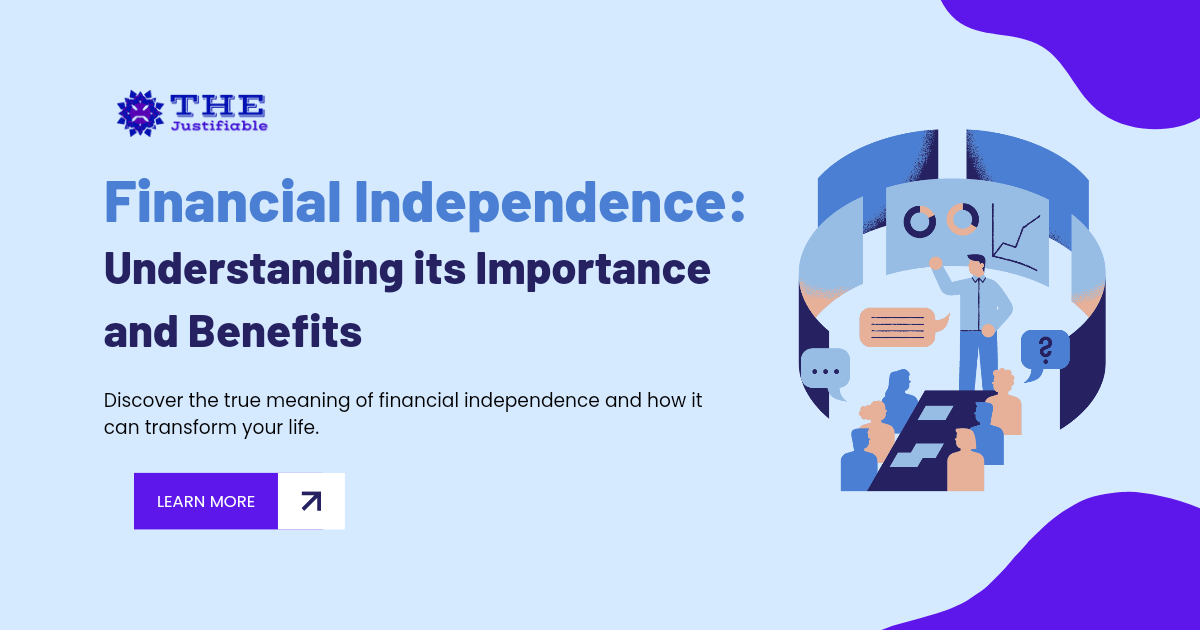Table of Contents
We live in a world where financial literacy is not a luxury, but a necessity. The ability to manage personal finances, understand investment opportunities, and navigate a path towards financial independence is crucial in today’s dynamic global economy.
This introduction aims to delve into the realm of financial independence, define what it entails, and shed light on its inherent importance.
Defining Financial Independence
Financial independence, a term often tossed around in personal finance and investment circles, may seem elusive to many. Yet, it is a crucial concept that holds the potential to transform lives.
But what exactly does it entail? In its simplest form, it refers to the state where an individual has sufficient income to cover their living expenses without being employed or dependent on others.
This income may come from savings, investments, passive income streams, or a pension. But it goes beyond the scope of mere monetary adequacy. It is about autonomy and freedom.
It’s the freedom to make choices that are not dictated by financial constraints, the freedom to take risks, and the freedom to pursue passions and interests that may not necessarily yield financial dividends.
It’s about creating a sustainable financial future that is resilient to economic uncertainties. Understanding the true essence of financial independence is the first step towards embracing it. It provides a direction, a goal, something to work towards in the journey of personal financial management.
Overview of the Importance of Financial Independence
Why is financial independence so important? Imagine having the ability to make life decisions without being overly stressed about the financial impact because you are prepared. You have the freedom to quit a job you don’t like, start a business, retire early, travel the world, or support causes you believe in.
Financial independence is not just about living a life of luxury; it’s about living a life of choices. It provides the cushion to withstand financial emergencies and uncertainties. It cultivates a sense of empowerment, enabling individuals to take control of their financial destiny and not be subject to the whims of economic downturns or job insecurities.
Moreover, it can lead to a sense of personal satisfaction and happiness. It reduces stress and anxiety associated with financial instability. It cultivates a sense of self-worth and confidence, knowing that you can provide for yourself and your family, not just today, but in the future as well.
Finally, understanding and striving for financial independence can foster financial literacy, prompting individuals to educate themselves about personal finance, savings, investments, taxes, and retirement planning. It’s not just about the end goal, but also about the journey and the invaluable financial lessons learned along the way.
The Concept of Financial Independence
As we delve deeper into the world of personal finance, understanding the concept of financial independence becomes an essential stepping stone. In this section, we’ll dissect the idea of financial independence, explain what it means in a broader context, and outline its foundational pillars.
Financial Independence Explained
Financial independence is more than just a monetary goal. It’s a lifestyle, a state of mind, and a commitment to personal growth and financial responsibility. To be financially independent is to have enough income to cover your living expenses without the need to work full-time.
The income that supports financial independence typically comes from a variety of sources such as investments, rental properties, royalties, and retirement accounts, among others.
However, it doesn’t necessarily mean one must stop working. Rather, it allows one the freedom to choose whether to work and what kind of work to engage in without worrying about the paycheck.
It grants the liberty to explore, to venture into new fields, to give back to the community, or simply to enjoy life in ways that regular employment might restrict.
In essence, financial independence is about securing a future where money does not dictate your decisions. It’s about living a life where financial stress doesn’t hinder your choices, where financial freedom fosters growth, opportunity, and contentment.
It’s about creating and nurturing a financial environment that supports and enhances your lifestyle choices, both in the present and the future.
The Pillars of Financial Independence
Financial independence may seem like a lofty goal, but it is achievable with careful planning, discipline, and a clear understanding of its key pillars:
- Income: This is not just about your salary but includes all possible sources of income, like investments, side businesses, and passive income streams. Diversifying your income is crucial in building financial resilience.
- Savings: Regular and disciplined savings can help accumulate a financial cushion that supports your journey towards financial independence. The ability to save effectively comes from living below your means and controlling unnecessary expenses.
- Investments: Investments, be it in stocks, real estate, or bonds, allow your money to work for you, creating additional income streams and supporting financial growth over time.
- Debt Management: Effective debt management is vital. It involves understanding the difference between good and bad debt, managing credit effectively, and systematically reducing debt to maintain financial health.
- Financial Education: Continually educating oneself about financial matters, staying updated about market trends, and understanding various investment vehicles are pivotal in making informed financial decisions.
These pillars serve as the foundation upon which financial independence is built. Understanding and incorporating them into your financial planning process is a stepping stone to achieving the freedom that financial independence brings.
The Importance of Financial Independence
The journey towards financial independence is a transformative process, holding far-reaching implications not just for our personal lives but for the larger economic landscape as well.
In this section, we shall explore the profound role of financial independence in shaping personal experiences and contributing to economic stability.
Emphasizing the Role of Financial Independence in Personal Life
In a personal context, the importance of financial independence cannot be overstated. Financial independence is fundamentally about freedom, empowerment, and security.
Freedom, in this context, translates into the ability to make life choices without monetary constraints. Want to explore a new career path, travel the world, start a business, retire early, or simply spend more time with your loved ones? Financial independence provides the freedom to pursue these aspirations without the constant worry of financial setbacks.
Financial independence also fosters empowerment. It instills a sense of control over one’s own life. It provides the confidence to navigate life’s financial challenges, make informed decisions, and set financial goals that align with personal aspirations.
Moreover, financial independence creates a sense of security. Having a robust financial base reduces stress associated with unexpected financial emergencies. It provides the peace of mind knowing that you have the means to sustain your lifestyle and support your loved ones, regardless of economic uncertainties.
Ultimately, financial independence enhances personal life by providing freedom, fostering empowerment, and ensuring security. It promotes personal growth, fosters resilience, and nurtures a sense of self-worth that extends far beyond financial metrics.
Financial Independence in Relation to Economic Stability
Financial independence also holds significant relevance in the broader economic context. When individuals strive towards and achieve financial independence, they contribute to the overall economic stability of their communities and the wider society.
Firstly, financially independent individuals are less likely to fall into debt traps, thereby reducing the societal burden of debt and its related issues. They are more equipped to navigate financial crises and less likely to rely on social safety nets, thereby contributing to their sustainability.
Furthermore, financially independent individuals are often active participants in the economy. They are more likely to invest in various financial instruments or real estate, thereby promoting economic activity and growth. They may also have the means to support local businesses, contribute to community development, and even stimulate job creation through entrepreneurial ventures.
Moreover, as financial independence fosters financial literacy, it leads to more informed consumers and investors. This heightened financial awareness can contribute to the overall health of the financial markets, promoting transparency, fairness, and stability
The Benefits of Financial Independence
Beyond the immediate allure of financial sufficiency, the journey towards financial independence offers profound benefits that shape our experiences and outlooks on life.
These benefits extend from personal security and freedom to empowerment and an enhanced capacity for decision-making, culminating in the creation of a sustainable financial future.
Financial Security and Freedom
One of the most compelling benefits of financial independence is the sense of security and freedom it provides. It alleviates the burden of financial uncertainty, ensuring that you are prepared to face life’s unexpected twists and turns, be it medical emergencies, job loss, or sudden lifestyle changes.
Freedom is the other side of the coin. Financial independence means you have the liberty to make life choices without being primarily driven by financial implications. Want to switch careers, take a sabbatical, or pursue a passion project? These become feasible options when financial independence is achieved.
It allows you to live life on your terms, making choices that align with your personal goals and values, rather than being dictated by financial necessity.
Empowerment and Enhanced Decision-Making
Financial independence is intrinsically linked with empowerment. When you take control of your financial destiny, you embrace a sense of self-efficacy and personal strength. You are not just a passive participant in your financial journey, but the one who charts the course and navigates the way.
This empowerment translates into enhanced decision-making. With financial independence comes financial literacy—the understanding of how money works, how to manage it, and how to make it work for you. This knowledge is empowering and fosters informed, confident decision-making.
Whether it’s choosing the right investment, planning for retirement, or buying a home, financial independence equips you with the tools and knowledge to make sound decisions that align with your financial goals and life aspirations.
Building a Sustainable Financial Future
Financial independence is not just about the present; it is about building a sustainable future. It means creating a financial roadmap that ensures long-term financial health and wealth preservation. It involves investing wisely, planning for retirement, and setting up systems that will continue to generate income, even when you choose to or can no longer work.
Financial independence helps to secure not just your future, but also the future of your loved ones. It provides the capacity to financially support your children’s education, leave a legacy, or even make a meaningful impact on a cause you deeply care about.
Steps Towards Achieving Financial Independence
Financial independence may seem like a daunting journey, but it becomes much more achievable when broken down into a series of steps. Each step brings you closer to your goal, empowering you to navigate your financial path with confidence.
Let’s delve into the critical steps involved in achieving financial independence: understanding your financial position, planning and saving, and embracing investment.
Understanding your Financial Position
The first step towards financial independence is understanding your current financial position. This entails a comprehensive review of your income, expenses, assets, and liabilities. How much do you earn? How much do you spend? What are your current debts and assets?
A thorough financial audit allows you to identify your financial strengths and vulnerabilities. It helps you spot spending patterns, identify areas for savings, and understand how you manage debt. It also allows you to set realistic financial goals and provides a benchmark to measure your progress towards financial independence.
Understanding your financial position is not a one-time task but an ongoing process. As your income, expenses, and life circumstances change, you’ll need to reassess your financial position periodically. By staying informed about your financial health, you’ll be better equipped to make decisions that align with your financial independence goals.
Planning and Saving
Once you have a clear understanding of your financial position, the next step is planning and saving. This involves creating a budget, setting financial goals, and adopting a disciplined savings habit.
A well-planned budget provides a roadmap for your spending, helping you to live within your means and avoid unnecessary debt. It also allows you to allocate funds towards your savings and investments systematically.
Setting clear, measurable, and realistic financial goals is also crucial. Whether it’s building an emergency fund, saving for a down payment on a house, or accumulating a retirement nest egg, having specific goals can motivate you and guide your saving and investment decisions.
Finally, cultivating a habit of regular savings is key. Consistent saving, no matter how small, can accumulate over time and provide a solid foundation for your financial independence journey.
Investment as a Pathway to Financial Independence
Saving is important, but to truly grow your wealth and achieve financial independence, investing is essential. Investments, whether in stocks, bonds, real estate, or other assets, can generate income and increase your wealth over time, thanks to the power of compounding.
Before diving into the investment world, it’s crucial to educate yourself. Understand different investment options, their potential returns, and associated risks. Consider your financial goals, risk tolerance, and investment timeframe to guide your investment choices.
Moreover, diversify your investments to spread risk and increase potential returns. Remember, investing is not about quick gains but about long-term growth. It’s about making your money work for you, contributing to your income, and supporting your journey towards financial independence.
By understanding your financial position, planning and saving effectively, and embracing investing, you can pave the way towards financial independence. It’s a journey that requires patience, discipline, and resilience, but the rewards—financial security, freedom, and peace of mind—are indeed worth it.
Nurturing a Financially Independent Mindset
Achieving financial independence isn’t just about the practical steps of budgeting, saving, and investing. It also involves cultivating a mindset that supports these actions. Let’s explore how a financially independent mindset plays a pivotal role in your journey towards financial freedom.
The Role of Financial Education
Education is a fundamental pillar of financial independence. A strong understanding of financial principles, market trends, and investment strategies can greatly influence your ability to make sound financial decisions. Educating yourself about personal finance can empower you to navigate the complexities of financial planning and investments with confidence.
You can build your financial literacy through reading financial books, attending seminars or webinars, following financial blogs, or even seeking professional advice. The goal is to constantly learn and stay updated with the financial landscape, enabling you to make informed decisions that align with your financial goals.
The Importance of Discipline and Consistency
Financial independence is a long-term goal that requires discipline and consistency. This means sticking to your budget, maintaining your saving habits, and staying the course with your investments, even when it’s challenging.
The consistency in your actions compounds over time and accelerates your progress towards financial independence. Conversely, impulsive spending, irregular saving, or reactive investing can derail your financial journey. By practicing discipline and consistency, you reinforce positive financial habits and move closer to your financial goals.
Embracing a Future-focused Perspective
Financial independence necessitates a future-focused perspective. It’s about making decisions today that will secure your financial future. This might mean prioritizing long-term financial goals over short-term desires, or investing for future growth instead of instant gratification.
A future-focused perspective encourages you to think beyond immediate needs and consider the long-term implications of your financial decisions. It fosters patience, helps you stay committed to your financial independence journey, and inspires you to build a financial legacy that lasts.
Overcoming Challenges in the Pursuit of Financial Independence
The path to financial independence is rarely a straight line. It is filled with hurdles and setbacks that can deter even the most determined individuals. However, understanding these challenges and devising strategies to overcome them can significantly enhance your success.
Dealing with Financial Setbacks
Financial setbacks are a part of life. Unforeseen expenses, job loss, or economic downturns can disrupt your financial plans and delay your journey. However, these setbacks don’t have to derail your financial goals.
Building an emergency fund is one of the most effective strategies for cushioning financial shocks. It provides a financial safety net that can cover unexpected expenses without disrupting your regular budget or forcing you into debt.
Moreover, having a flexible financial plan can help you navigate financial setbacks. This means being able to adjust your budget, savings, or investment plans in response to changing financial circumstances. A flexible plan empowers you to manage financial setbacks without losing sight of your long-term financial independence goals.
Managing Lifestyle Inflation
Lifestyle inflation refers to increasing your spending as your income increases. It’s a common challenge that can hinder your progress towards financial independence. As your income grows, it’s tempting to upgrade your lifestyle—bigger house, better car, luxurious vacations, and so on.
Managing lifestyle inflation involves mindful spending—aligning your spending with your values and long-term financial goals. It’s okay to treat yourself or improve your lifestyle as your income grows, but it’s crucial to do so in a way that doesn’t compromise your financial independence journey.
Overcoming Fear and Uncertainty
Fear and uncertainty can significantly impact your financial decisions and potentially your journey towards financial independence. Fear of investing, fear of losing money, uncertainty about the future, or even doubts about your ability to achieve financial independence can hold you back.
Education is a powerful antidote to fear and uncertainty. Understanding financial principles, investment strategies, and risk management can give you the confidence to make informed financial decisions. Additionally, creating a diversified investment portfolio can help mitigate financial risks and ease investment fears.
The pursuit of financial independence can be a challenging journey, fraught with setbacks, lifestyle inflation, and fear and uncertainty. However, by anticipating these challenges and adopting strategies to overcome them, you can stay on track and continue moving forward towards your financial independence goals.
Reinforcing the Importance of Financial Independence
Financial independence isn’t merely a desirable state of affairs—it’s a cornerstone of a secure, fulfilling life. By breaking away from the constraints of financial dependency, we not only safeguard our future but also empower ourselves to make life choices that align with our values and aspirations, rather than being dictated by financial constraints.
The freedom that comes with financial independence provides a sense of security and peace of mind that is priceless. It allows us to weather financial storms with less stress and provides a safety net that cushions the impact of life’s unexpected turns.
Moreover, financial independence fosters empowerment, enabling us to make decisions based on what is truly important to us. It paves the way for a sustainable financial future, allowing us to leave a lasting financial legacy.
Final Thoughts on the Journey towards Financial Independence
The journey towards financial independence is a deeply personal one, fraught with challenges and triumphs. It requires commitment, discipline, and a clear understanding of personal finance. It’s not about reaching a specific number or crossing a finish line but about building a financial structure that supports your life goals and aspirations.
Remember, financial independence isn’t achieved overnight—it’s a gradual process that unfolds over time. Each step, no matter how small, brings you closer to your goal. The key is to start where you are, with what you have, and to keep moving forward.
In the end, the journey is as rewarding as the destination itself. It’s an exploration of personal growth, a testament to resilience, and a celebration of financial empowerment. It’s about taking control of your finances and, in turn, taking control of your life.
With this comprehensive guide on financial independence, we hope to have provided you with valuable insights and practical steps to embark on your journey towards financial independence. Remember, the journey is yours—embrace it, navigate it, and most importantly, enjoy it. Here’s to your financial independence!
Frequently Asked Questions about Financial Independence
As we’ve ventured into the extensive topic of financial independence, it’s natural to have questions arise about this crucial financial state. To further enhance your understanding and guide you in your journey, let’s address some of the most frequently asked questions.
How do I start my Journey to Financial Independence?
Understand Your Current Financial Situation: Evaluate your current financial status. Understand your income, expenses, assets, and liabilities. Get a clear picture of where your money is coming from and where it is going.
- Set Clear Financial Goals: Define what financial independence means to you. Is it having enough savings to retire early? Is it generating a passive income that covers your living expenses? Is it owning a paid-off home? Define your goals and quantify them.
- Create a Budget: A budget is a plan that helps you prioritize your spending. It allows you to allocate funds to necessary expenses and savings while cutting off unnecessary expenses. Stick to your budget to avoid debt and increase savings.
- Clear Your Debts: Debts, especially high-interest ones, can seriously hamper your journey. Make a plan to pay off your debts as quickly as possible. Start with the ones with the highest interest rates.
- Build an Emergency Fund: An emergency fund serves as a financial buffer in case of unexpected expenses or income loss. Aim to have at least three to six months’ worth of living expenses in your emergency fund.
- Generate Multiple Income Streams: Relying on a single income source can be risky. Explore ways to create multiple income streams. This could include freelance work, starting a home-based business, investing in rental properties, creating digital products, or more.
- Continually Educate Yourself: Stay updated with financial news, new investment opportunities, and financial management strategies. Read books, attend seminars, listen to podcasts, or take online courses.
- Plan for Retirement: Start contributing to your retirement fund as early as possible. Take advantage of employer matching programs if available. Consider setting up a self-employed retirement plan if you work for yourself.
- Review and Adjust Regularly: Lastly, regularly review your financial plan. Adjust your budget, investment strategies, and financial goals as needed.
Remember, the journey to financial independence is not a get-rich-quick scheme. It’s a lifelong journey that requires consistency, patience, and discipline. With the right mindset and strategies, achieving financial independence is within your reach.
How do I maintain Financial Independence?
Maintaining financial independence requires ongoing commitment and financial discipline. Here are some strategies to help you preserve your financial independence:
- Live within your means: This doesn’t necessarily mean leading a frugal lifestyle, but rather making conscious spending decisions that align with your income and financial goals.
- Save and invest consistently: Regardless of market conditions, continue to regularly contribute to your savings and investments. The power of compounding can greatly enhance your wealth over time.
- Manage risk: This includes having an emergency fund, diversifying your investments, and protecting yourself with appropriate insurance policies.
- Keep learning: The financial landscape is continually evolving. Stay informed about financial trends and investment opportunities to make informed decisions.
- Adjust your financial plan as needed: Life changes, and so too should your financial plan. Whether it’s a new job, a growing family, or retirement, adjust your financial strategies to align with your evolving life circumstances.
Financial independence is not a one-time achievement but a state to be maintained over time. With mindful financial practices and a commitment to continuous learning and adjustment, you can preserve your financial independence for the long term.






